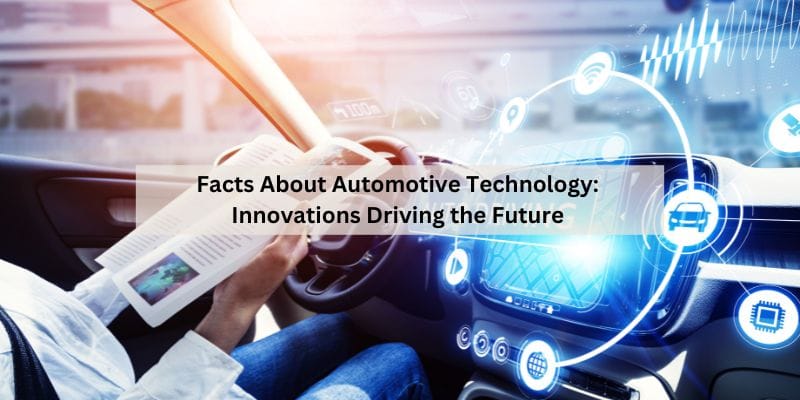Facts About Automotive Technology: Innovations Driving the Future
Automotive technology encompasses the study and application of the mechanics and technology that power today’s vehicles. It involves creating and designing vehicle technology, as well as repairing and maintaining vehicles.
From fuel-efficient engines to advanced safety features, automotive technology plays a crucial role in the functionality and innovation of cars. The automotive industry continues to evolve with advancements such as electric and autonomous vehicles, making it an exciting field for both professionals and enthusiasts alike.
With a constant focus on improving performance, efficiency, and safety, automotive technology is at the forefront of transportation innovation.
The Evolution Of Automotive Technology
Automotive technology has come a long way, evolving from horsepower to advanced electric vehicles. The key milestones in vehicle tech include the invention of the internal combustion engine, the introduction of safety features such as seat belts and airbags, and the development of hybrid and electric cars. Automotive engineers play a crucial role in creating new vehicle designs using cutting-edge computer-aided design technology. Today’s cars are equipped with sophisticated features like voice-activated commands and built-in navigation systems, showcasing the high-tech nature of modern automobiles. The study of automotive technology encompasses the mechanics and technology driving today’s cars, offering a wide range of career opportunities in the automotive industry.
Electric Vehicles: Leading The Charge
Electric vehicles (EVs) are paving the way for sustainable transportation. Cutting-edge battery technologies are extending the driving range of EVs, addressing one of the major concerns of consumers. Innovative materials and designs are enhancing the energy storage capacity, making EVs more practical for everyday use.
The transition to electric mobility requires a robust charging infrastructure. Investments in charging stations and smart grid technologies are essential to support the growing number of EVs on the road. Rapid charging stations are being deployed to minimize charging times, providing convenience for EV owners.
Autonomous Vehicles: On The Road To Self-driving
Embarking on the road to self-driving, autonomous vehicles are revolutionizing automotive technology. With advanced sensors and AI, they can navigate roads and make decisions without human intervention. This groundbreaking innovation is set to transform the way we travel and has the potential to greatly enhance road safety.
| Autonomous Vehicles: On the Road to Self-Driving | |
|---|---|
| Levels of Autonomy | Self-driving cars have different levels of autonomy, ranging from 0 to 5. Level 0 means that the driver is responsible for all aspects of driving, while level 5 means that the car can drive itself in all situations without any human intervention. Most cars on the road today have level 1 or 2 autonomy, which means that they have some advanced driver assistance systems, but the driver is still responsible for most of the driving tasks. |
| Safety and Ethical Considerations | As self-driving cars become more common, there are several safety and ethical considerations that need to be addressed. For example, who will be responsible in case of an accident involving a self-driving car? How can we ensure that self-driving cars are programmed to make ethical decisions? These are complex issues that require careful consideration and collaboration between the automotive industry, policymakers, and society as a whole. |
Autonomous vehicles are the future of transportation, and they have the potential to revolutionize the way we travel. However, before we can fully embrace this technology, we need to address some important issues. One of the most critical factors is the level of autonomy of self-driving cars. There are different levels of autonomy, ranging from 0 to 5, and each level represents a different degree of automation. Another crucial consideration is safety and ethical concerns. As self-driving cars become more common, we need to ensure that they are safe and programmed to make ethical decisions. By addressing these issues, we can pave the way for a safer and more efficient future of transportation.
Connectivity: Cars In The Internet Age
The connectivity of cars in the Internet Age has opened up new possibilities for Vehicle-to-Everything Communication (V2X). This technology allows vehicles to communicate with each other, as well as with infrastructure and pedestrians, leading to a safer and more efficient driving experience. The impact on driver experience is significant, with features such as real-time traffic information, predictive maintenance alerts, and enhanced navigation systems providing a more seamless and enjoyable journey. Additionally, V2X communication can pave the way for advanced driver assistance systems and ultimately, fully autonomous vehicles, revolutionizing the way we interact with our cars.
Alternative Fuel Solutions
Alternative fuel solutions are gaining popularity in the automotive industry. Hydrogen fuel cells are one such solution that can power vehicles using hydrogen gas. These cells produce electricity through a chemical reaction, emitting only water vapor as a byproduct. Biofuels and synthetic fuels are another alternative, made from renewable resources such as corn or algae. These fuels can be used in existing gasoline or diesel engines with minimal modifications.
Smart Manufacturing: Revolutionizing Production
The automotive industry is constantly evolving, and one of the most exciting developments in recent years has been the rise of smart manufacturing. This approach leverages cutting-edge technologies to optimize production processes, resulting in faster, more efficient, and more cost-effective manufacturing.
3d Printing In Automotive
One of the most promising applications of smart manufacturing in the automotive industry is 3D printing. This technology allows for the creation of highly complex and customized parts with incredible precision and speed. As a result, 3D printing is revolutionizing the way that automotive manufacturers design and produce parts, leading to significant improvements in quality, speed, and cost.
Ai On The Factory Floor
Another exciting development in smart manufacturing is the use of artificial intelligence (AI) on the factory floor. By leveraging advanced algorithms and machine learning techniques, AI systems can monitor and optimize production processes in real time, identifying inefficiencies and making adjustments on the fly. This leads to faster, more efficient, and more reliable production, with fewer errors and less waste.
The Role Of Artificial Intelligence
The integration of Artificial Intelligence (AI) in vehicle maintenance has revolutionized the automotive industry. AI-powered systems can analyze and predict potential issues, leading to proactive maintenance and enhanced vehicle reliability.
AI has transformed navigation systems in vehicles, providing real-time traffic updates, personalized route suggestions, and seamless integration with other smart devices, offering enhanced user experiences.
Sustainability In Automotive Design
Sustainability is a crucial aspect of modern automotive design, and the use of recyclable materials is becoming increasingly popular. Many automakers are now utilizing materials such as recycled plastics and aluminum to reduce their carbon footprint. In addition to using recyclable materials, automakers are also focused on reducing emissions in their vehicles. This has led to the development of electric and hybrid cars, as well as advancements in traditional gasoline engines to make them more fuel-efficient and eco-friendly. By prioritizing sustainability in automotive design, the industry is making strides towards a cleaner, greener future.
Future Trends In Automotive Tech
Augmented reality (AR) dashboards are revolutionizing the driving experience by overlaying real-time information onto the driver’s field of vision. This technology enhances safety and convenience by providing navigation prompts, vehicle performance data, and real-time traffic updates without the need to take eyes off the road.
Blockchain technology is set to transform the automotive industry by providing a secure and transparent platform for managing vehicle data, ensuring the authenticity of vehicle history, and facilitating secure transactions. With blockchain, fraud prevention and supply chain optimization are significantly enhanced.
Frequently Asked Questions
What Is An Interesting Fact About The Automotive Industry?
An interesting fact about the automotive industry is that it takes only about half an ounce of fuel to start a car. This highlights the efficiency and effectiveness of modern automotive technology.
What Are 3 Interesting Facts About Cars?
Here are three interesting facts about cars:
1. The average car consists of about 30,000 parts, including nuts, bolts, and screws.
2. The world’s fastest car, the Bugatti Chiron, can reach speeds of up to 261 mph.
3. The first car accident in history occurred in 1891, when a horse-drawn carriage collided with an electric car in Ohio.
What Are Some Interesting Facts About Auto Mechanics?
Auto mechanics are skilled professionals who repair and maintain vehicles using advanced technology. They analyze and provide creative solutions for vehicle issues. Interesting facts about auto mechanics include their ability to diagnose problems using computer-aided design technology, their expertise in working on all types of vehicles, including electric cars, and their knowledge of the intricate technology found in modern vehicles.
What Are Some Interesting Facts About An Automotive Engineer?
Automotive engineers use computer-aided design technology to create new or improved designs for vehicle parts. They analyze and solve technical problems during production. Automotive technology is constantly advancing, with features like voice commands and built-in navigation becoming common in cars.
Pursuing a career in automotive technology offers opportunities for hands-on experience and a competitive salary.
Conclusion
Automotive technology has revolutionized the way we interact with our vehicles. From advanced safety features to cutting-edge infotainment systems, the automotive industry is constantly pushing the boundaries of innovation. As we continue to embrace the digital age, it’s exciting to see how technology will continue to shape the future of transportation.
Whether it’s self-driving cars or electric vehicles, the possibilities are endless. So buckle up and get ready for a thrilling ride into the future of automotive technology.







